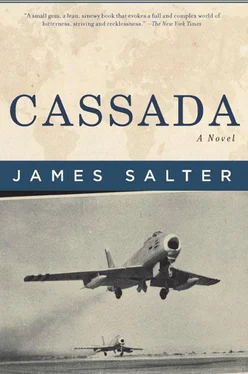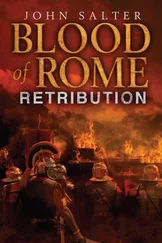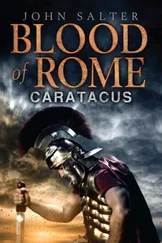The others were listening, turned sideways in the seats or leaning from above, holding on with one hand.
“I seen a lot of them,” Bonney said, “but I’ll tell you one thing, he’s the finest.”
“No.”
“The finest.”
“The colonel is.”
“Not as a gunner. As a officer, yeah. Not as a gunner.”
“Every way.”
“No, no. Hell, man, just look at the scores.”
“The scores ain’t everything.”
“Oh, yeah? What else is there?”
“They ain’t everything.”
They were going down the unlit stretch along the beach. The water was invisible, the color of the night. They rocked along like commuters, the axles squeaking. Cassada’s head was bent down as if in thought, but his eyes were open. The light struck his cheekbones. Isbell was remembering, for no reason, the day he had come around the corner of the hangar with the flying suit wet and stuck to him and unwilling to go back and change. How for a moment, before knowing anything, Isbell had thought: this one’s different.
“Listen,” the sergeant said, “I was in Vegas close to three years. I seen them all.”
“Oh, yeah? You remember the one took all the trophies at the meet there a couple of years back? That West Point major?”
“Sure. I know him. He’s a real hotshot.”
“What’s his name again?”
“I know him,” the sergeant said. “I seen him shoot.”
“You think Lieutenant Piebes could beat him?”
“Hell, yes, he could.”
“He ain’t that good.”
“You want to know what he told me about how he learned shooting?”
“What?”
“I was talking to him the other day and he said, Bonney, I learnt it from flying the tow ship.”
“From what?”
“From flying the tow ship, he said.”
“Hell, Bonney.”
“No, that’s right. That’s right. It’s like a caddie learns how to play golf.” He looked around. “How do you think they learn? By watching good golfers, that’s how.”
He was searching for someone in the dark of the bus, squinting. “Hey, Lieutenant,” he said to Isbell. Then, moving his head a little, “What is it? Captain. I’m sorry. Listen, tell them, isn’t that right, that the way to learn is to watch somebody doing it who really knows how?”
“That’s one way.”
“There you are,” he cried.
“He ditn’t say it was the best way.”
“You heard the captain. I didn’t say nothing about the best way. It don’t have to be the best way. The best way is different for everybody, right, Captain?”
Isbell nodded.
Coming to the officers’ area, the bus slowed down. When it stopped, Isbell and Cassada jumped off. The door groaned shut and like a battered metal curtain the side of the bus slid past them. They crossed towards their tent. Only the colonel’s was noisy. Many people were asleep, ready for departure the next day. Off for Rome or Marseilles, the first leg home.
“What time do you plan to take off?” Cassada asked.
“Let’s get going early. Right after breakfast.”
“I hate to leave here,” Cassada said.
“Maybe you picked up a thing or two.”
“Sergeant Bonney. I don’t know how much he really knows, but he wasn’t that far off.”
“It was a good week.”
“This was the best thing that’s happened to me since I’ve been in the squadron.”
Two of Pine’s pilots, Leeman and Sparrow, had taken off early and landed at Marseilles. Their planes were being refueled when Leeman came back from the metro office. Sparrow was waiting.
“All set? Are we ready to file?” he said.
Leeman was thin and known as the Deacon. He shook his head.
“Doesn’t look like we’re going anywhere today. The weather’s down.”
It was sunny and bright outside. Sparrow put down the paper.
“Come on,” he said, “what is it, five thousand and five?”
“No, we’re going to be here overnight.”
“What do they have?”
“It’s down to minimums. We might as well go into town.”
Sparrow lifted his cap and smoothed his hair. His legs were stretched out in front of him. “Minimums,” he said. Marseilles, though, was like that. Clear and fifteen and not another field open in Europe. Your only alternate is Marseilles—the countless times they heard that. “I’ll be damned,” he said. “Well, you know me.”
“What do you mean?”
“I’m ready. Call a cab.”
“We can go into Marignane,” Leeman said. “They have a hotel there.”
“Marignane?”
“It’s not that far.”
“Let’s go to Marseilles.”
“That’s a long way.”
“Come on, how much can it cost?”
“It’s not that. I want to be able to get off first thing in the morning if the weather breaks up there.”
“We can get up early.”
“No.”
“Oh, for God’s sake. Why go anywhere? We can stay here and curl up right under the wing. That way we won’t lose a minute.”
“I don’t want to drive all the way into Marseilles,” Leeman told him.
They were still there in mid-afternoon waiting to see if the weather would change. Four more planes from Tripoli had landed and the pilots had gone into town. Leeman finally gave up.
“Let’s go out and get our clothes bags,” he said.
Another two ships were in the traffic pattern, just breaking and turning to downwind. It was Isbell’s flight. They’d been delayed because of mechanical trouble. They landed and parked next to the planes already there.
“Must be weather,” Isbell said to Cassada as they walked to operations.
Leeman and Sparrow were just leaving.
“What’s the story?” Isbell said.
“Doesn’t look good up there,” Leeman told him. “I don’t think you’ll get home today.”
“Where are you headed for?”
“We’ve got a taxi coming. We’ll give you a ride if you want.”
“I think we’ll just have a look at things.”
The French forecaster repeated what he had told the others. There was the influence of a deep low, he said, down to Lyons, on which city he tapped a knowing finger. Elbows on the counter, Isbell looked at the surface chart. There were no station sequences. The regular teletype net had been out since the day before, the forecaster said.
The big chart was twelve hours old, a forest of purple numbers and knotholes of pressure. There might be an alternate in England. Isbell felt a slight temptation. There were pilots who were apprehensive about weather and others for whom dense rain and fog were a lure, part of a reputation.
“Don’t decide because of me,” Cassada said. He was standing beside Isbell. “I can fly your wing through any of that.”
Isbell felt the temptation.
“I’m with you, Captain.”
“We’d have to penetrate, who knows, maybe from thirty thousand,” Isbell said.
“I’ll touch down right beside you.”
There was the seductive image of the two of them, wheels folding birdlike beneath as they rose from the runway and headed north where no one else would go, where no one would dare to, but he was too wise to succumb to it. What was to be gained? Nothing useful.
“How much weather time do you have?” Isbell said.
“Actual weather?”
“Real weather, not under the hood.”
“Twenty, twenty-five hours.”
“Twenty-five?”
“Twenty. But the main thing is, how much do you have?”
Isbell looked at him. After a moment he acknowledged, “Plenty.”
“Why don’t we try it? We could always come back to Marseilles?”
“We can’t file with Marseilles as an alternate. We’d have to find something closer. I don’t know if we can find anything.”
Читать дальше












